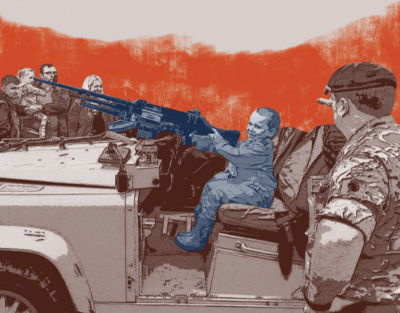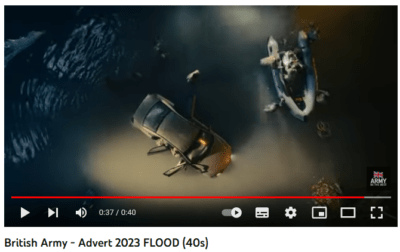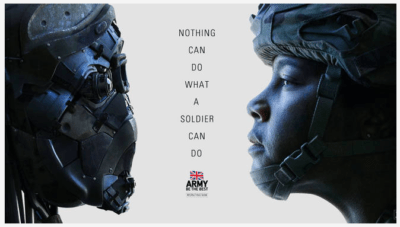Start Thinking Gamer: the British military’s new recruitment frontier
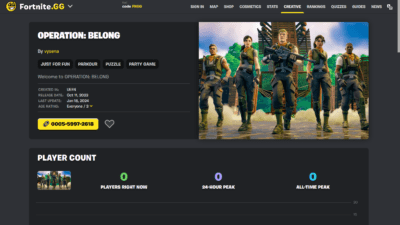
The history of video-games is, unfortunately, one that involves the military. Arguably the first digital video-game, SpaceWar!, was created by Pentagon-funded grad students at the Massachusetts Institute of Technology (MIT) in the early 1960s. As the name suggests, the game itself was based on militarism and wedded to the twin concepts of nuclear conflict and space exploration prevalent at the time. The first known video-game tournament – a precursor to the now burgeoning eSports industry – saw competitors battle it out on SpaceWar! at the Pentagon funded Stanford Artificial Intelligence Lab in Calfornia. Military funding essentially meant Stanford University was one of only a handful of places globally with the hardware to host such an event.
The industry spawned by SpaceWar! has created a multitude of titles focused on warfare, from Atari’s Space Invaders and BattleZone, to Konami’s Contra, EA’s Desert Strike and, of course, the immensely popular Call of Duty franchise. To name but a few! And lest we forget the Pentagon’s foray into game development with uber-recruitment tool America’s Army, a free to play first-person shooter released in 2002 that was available on PC, Xbox and PlayStation during its 20-year lifespan. The US military was also a key funder of many of the technologies that led to the advancement of videogames throughout the Cold War period, including the Internet and 3-D navigation in virtual environments.
Fortnite Debacle
A new version of America’s Army was being considered before its servers shut down for good in May 2022, but the US military realised it had found more fertile recruitment ground in streaming and eSports. So, perhaps it’s not surprising that the British Army turned to one of the world’s largest online games for its latest recruitment promotion. The Fortnite series has been a sensation since it was launched by Epic Games almost seven years ago, with 2018’s Fortnite Battle Royale pulling in more than 125 million players in under 12 months. The game is also no stranger to brand partnerships, with the Epic Games owned Zen Creative – and others like it – designing “brand activations” within Fortnite for clients including the Australian Open, Sony and Soundcloud. The Army’s plan was to have well known social media influencers go head-to-head in a custom built section of the game and broadcast it live on the popular gaming website Twitch.
But the plan hit a snag. One that calls into question the due diligence of British military recruiters and, quite possibly, Vysena Studios, the agency that built the customised gaming element. The Fortnite Island Creator Rules, a document drawn up by Epic to govern what can and cannot be done with the game’s creative mode options, clearly states that commercial content and sponsors “must not […] promote enrolment in the military”. If the British Army were willing to overlook these guidelines, it is hard to see how they’d ensure the content wasn’t having adverse impacts on kids way below the recruitment age. It is surprising Vysena would make such a mistake, considering this is not the first Fortnite adventure they’ve made. They also work with brands including Warner Bros and JBL, to create “Fortnite experiences”.
The issue wasn’t lost on some in the gaming community, who used social media to criticise the Army’s use of Fortnite. Following a backlash to the campaign, all online content associated with the British Army recruitment drive has been removed. This includes a cinematic trailer advertising a Twitch livestream in which YouTubers Elz the Witch and Yung Filly were to compete in the customised Fortnite area. Both high-profile influencers have also removed all reference to the event, which was scheduled for 24 January. Before it was pulled, Army Jobs put out a post stating “all live streams & game play is age-gated to users 18+” (despite how difficult this is to do on Twitch) and that the map would not be available for public access. It had little impact in stemming the backlash. In a response to the website Eurogamer, Epic said the promotion was currently “undergoing moderation”.
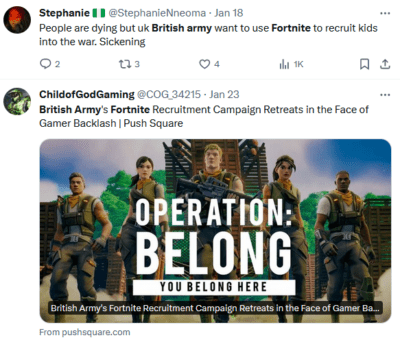
Stats on Fornite users are hard to find, but some estimates put almost two-thirds of players in the 18-24 age bracket. However, a high percentage of young people below the recruitment age are gaming online in the UK these days. According to uSwitch, in 2023 around three-quarters of 12-15 year-olds were online gamers, with marginally less take-up amongst those aged 16-24 (71%) and 8-11 (69%). While this does include games other than Fortnite, it also shows the huge risk that kids as young as eight could come into contact with recruitment material. Plus, Fortnite comes with a 12 rating so the British Army would be clearly aware that some players are pretty young.
Start Thinking Gamer
The Fortnite campaign should not be seen in isolation, but as part of a wider strategy from the British Army to carve out a space within the UK gaming community. In fact, this is not even the first time the Army received criticism for targeting gamers whilst running the risk of advertising to children. The February 2019 issue of Official PlayStation Magazine came with a copy of the Army’s Locker publication – including details on how to sign-up. According to an MoD spokesperson at the time, The Locker aimed to “reach both potential soldiers and their parents or guardians.” And, while the spokesperson stressed it does not target under-16s it is hard to deny that some PlayStation Magazine readers are in that age bracket.
But the British military has been advertising in video-game magazines since they rose to prominence during the 1990s. The very first issue of PlayStation Magazine, which came out in November 1995 to coincide with the launch of Sony’s debut console in the UK, featured an RAF advert. As did the October 1994 and July 1995 issues of GamesMaster magazine, whilst the Royal Navy ran an ad in the February 1995 issue of Sega’s Mean Machines. With scanned copies of magazine back issues hard to come by, we’ve only been able to scratch the surface.
Neither is Operation: Belong – as the Fornite project is called – the Army’s first attempt at gamifying their recruitment advertising. The ‘Start Thinking Soldier’ campaign from 2009 was an explicit attempt to reach potential recruits – especially teenage men – through gaming aesthetics. Whilst some of the peripheral elements, like print and radio, did not suit the approach, it excelled in television and, more importantly, online. In a telling submission to the 2010 D&AD advertising awards, campaign creators Publicis London outlined their approach:
‘How do you convince a typical 17-year-old that the army is a great career? Talk to them in a language they understand – gaming. The TV campaign, shot in the style of a first-person shooter, took the viewer on a mission. The correct answer to a task at the end of each spot unlocked more levels to the mission online‘.
The online component – which was the core of the campaign – used a combination of game engine and real footage to put players through a series of challenges, accompanied by a scoreboard ranking the best competitors. The highest scorers were invited to an in-person event where they could meet the Army and, in the words of Publicis London, “compete for real”. This turned out to be something akin to a competitive gaming event, but with a chance to handle physical weapons thrown into the mix. The company claim over a million people interacted with the campaign and, as a result, recruitment targets were hit for the first time in 12 years.
Long Term Vision
More recently, the British Army have taken the idea of speaking to 17-year-olds through the language of gaming to a whole new level. The Army Esports Community was officially launched in April 2020, off the back of the growing success of individual eSports teams and an engagement event at the 2019 Insomnia gaming festival. The Army says support for eSports has an internal and external focus, with the former based on ensuring retention and soldier welfare. Yet, while this is undoubtedly the case, documents obtained through Freedom of Information requests suggest the external focus holds more importance.
The British Army eSports brief from July 2020 lays out the what, why and how behind the setting up of an Army eSports Club and material support for gamers in the ranks. The first two lines of the why are instructive:
‘Computer games are a major part of the lives of young people today and comprise a significant portion of their recreation time. Esports and the Army esports Club offers an opportunity to humanise soldiers and build similarities with the audiences we most wish to influence and recruit‘.
But there is also caution, with the section warning that ‘it is essential this is not over sold as recruiting. The US Army has been badly tarnished due to its overly strong recruiting push in esports’. This is a classic British Army ploy. Let’s do the same thing, but maybe in a subtler way than those gung-ho Americans. Yet the focus on recruitment potential is clear, despite an obvious desire to also support personnel in a hobby (including building gaming areas at barracks to allow soldiers without computers to take part).
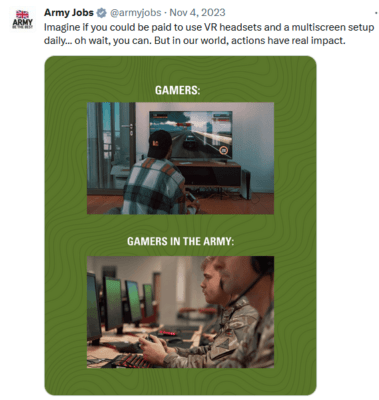 British Army eSports now run a Discord and a Twitch channel, where interactions with the public – or the MTA (main target audience) in military parlance – is unregulated. And if soldiers taking part in the gaming events are not told they are essentially taking part in soft recruitment then there is no incentive for them to self-regulate and pay attention to the age of people they interact with. The nature of the online gaming community, and how Discord and Twitch work, also means users can remain anonymous behind their online personas – which is not necessarily a bad thing but does mean it’s hard to gauge the age of participants. Which is partly why the backlash against the Fortnite campaign was so strong.
British Army eSports now run a Discord and a Twitch channel, where interactions with the public – or the MTA (main target audience) in military parlance – is unregulated. And if soldiers taking part in the gaming events are not told they are essentially taking part in soft recruitment then there is no incentive for them to self-regulate and pay attention to the age of people they interact with. The nature of the online gaming community, and how Discord and Twitch work, also means users can remain anonymous behind their online personas – which is not necessarily a bad thing but does mean it’s hard to gauge the age of participants. Which is partly why the backlash against the Fortnite campaign was so strong.
The Army eSports team has gone from strength to strength since 2020, with regular appearances at the twice-yearly Insomnia festival – where they compete in gaming events while kids clamber over a tank at the vast British Army stand in the exhibition hall. They have also run stands at Wales Comic Convention and Rapture Gaming Festival. And the Army Jobs social media accounts are increasingly targeting gamers with posts linking characters in Valorant, or gaming preferences, to roles in the military. So, whereas Start Thinking Soldier aimed to speak to gamers over a specific recruitment campaign, eSports is being utilised as a way to engage gamers in perpetuity.
If you are considering a career in the British Army, or know someone who is, then visit Before You Sign Up to learn about the risks.
See more: militainment, recruitment, recruitment age, advertising, ethics, gaming
Like what you read?
> Sign up for our newsletter or blog notifications
> Support our work – from just £2 a month

